Analyzing Leadership and Management in the Service Industry Context
VerifiedAdded on 2023/01/12
|13
|4210
|90
Report
AI Summary
This report provides a comprehensive analysis of leadership and management within the service industry. It begins by introducing classical management theories, including scientific, administrative, and bureaucratic approaches, and their relevance to service-based organizations. The report then explores the vital role of leaders, differentiating their functions from those of managers, and examines various leadership styles such as democratic, transformational, and laissez-faire, highlighting their strengths and weaknesses in different situations. Furthermore, the report delves into different management styles, including persuasive, consultative, paternalistic, and democratic, and their impact on employee engagement and organizational goals. It also discusses the internal and external factors, such as political, economic, social, technological, and legal influences, that shape and affect management styles in the service sector. The report emphasizes the importance of adapting management strategies to these factors to ensure organizational success and responsiveness to industry changes.
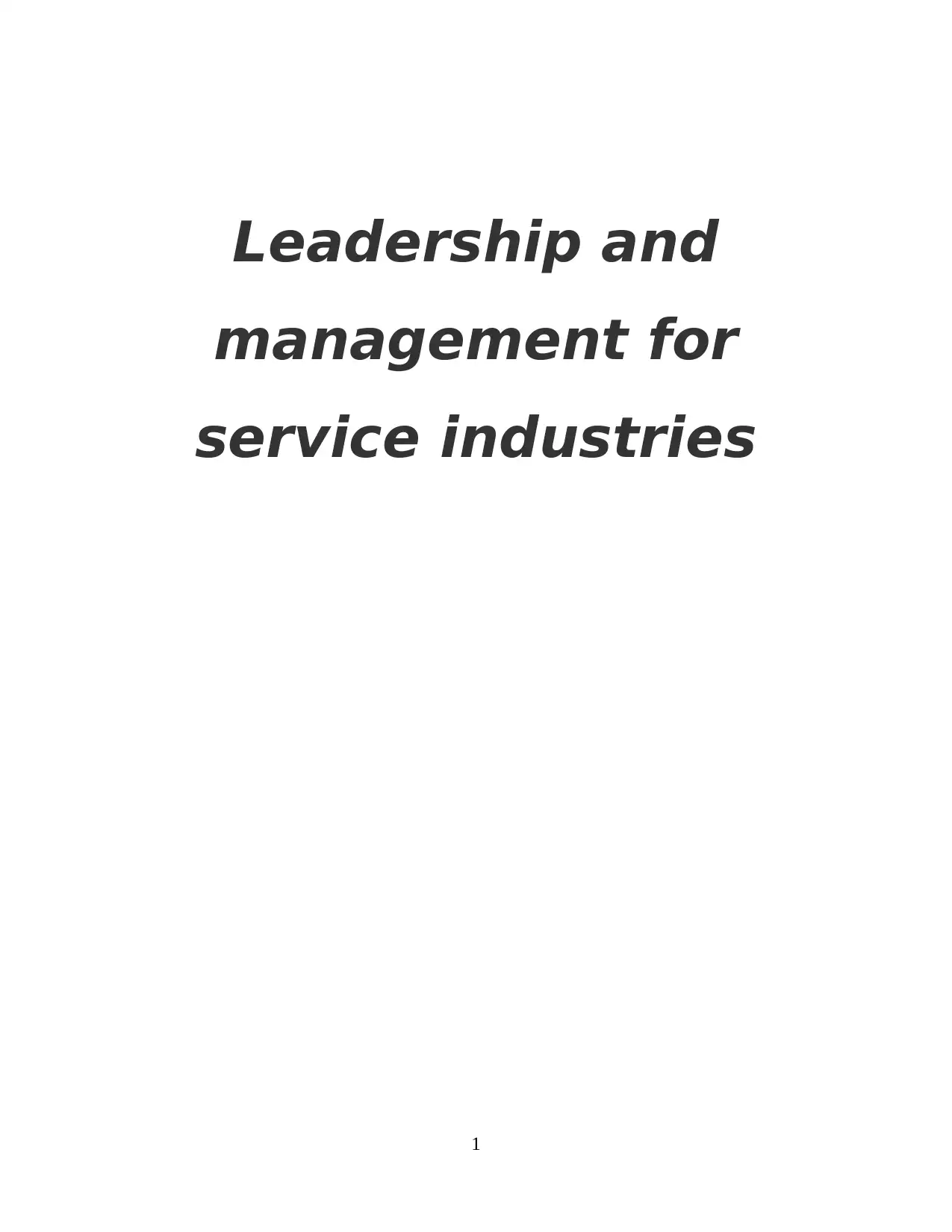
Leadership and
management for
service industries
1
management for
service industries
1
Paraphrase This Document
Need a fresh take? Get an instant paraphrase of this document with our AI Paraphraser
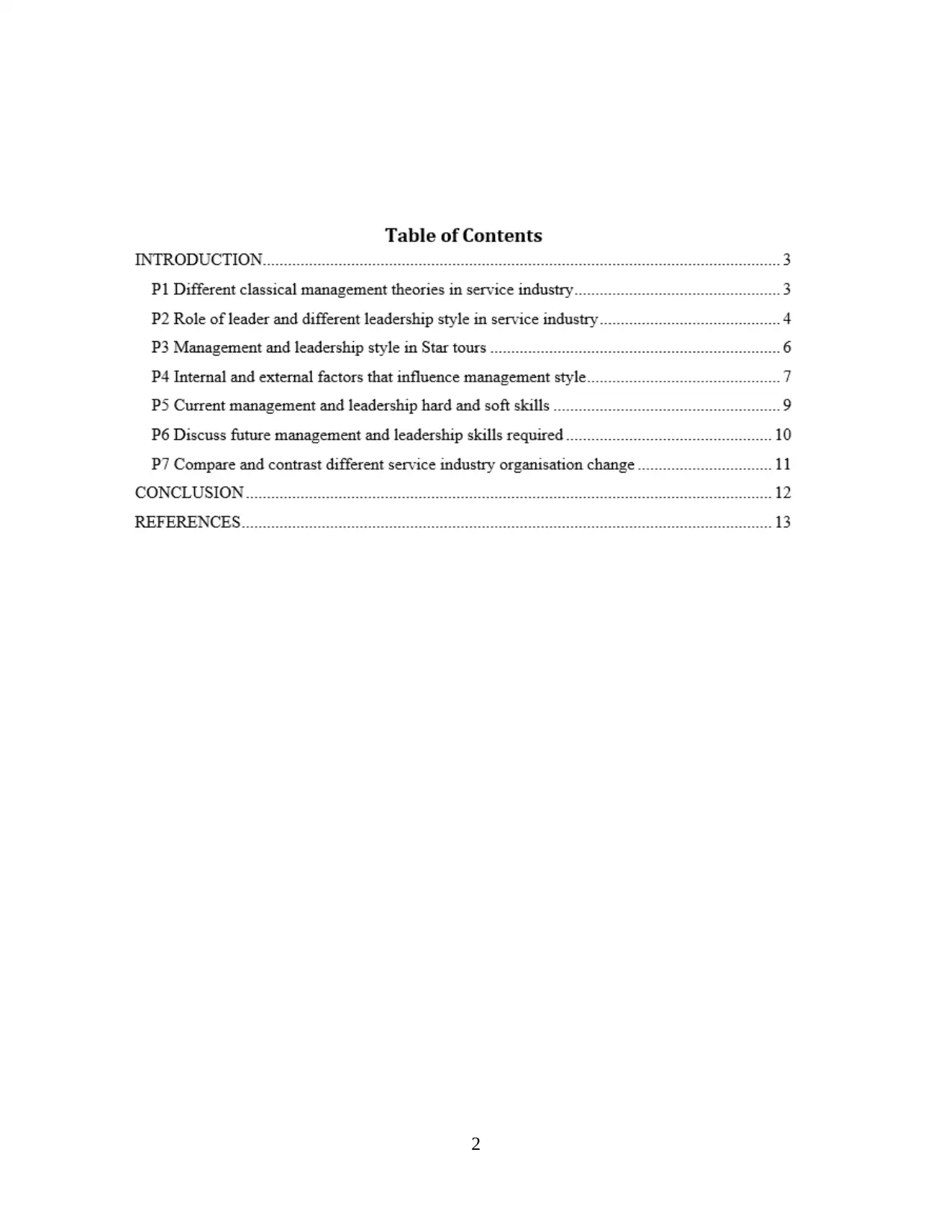
2
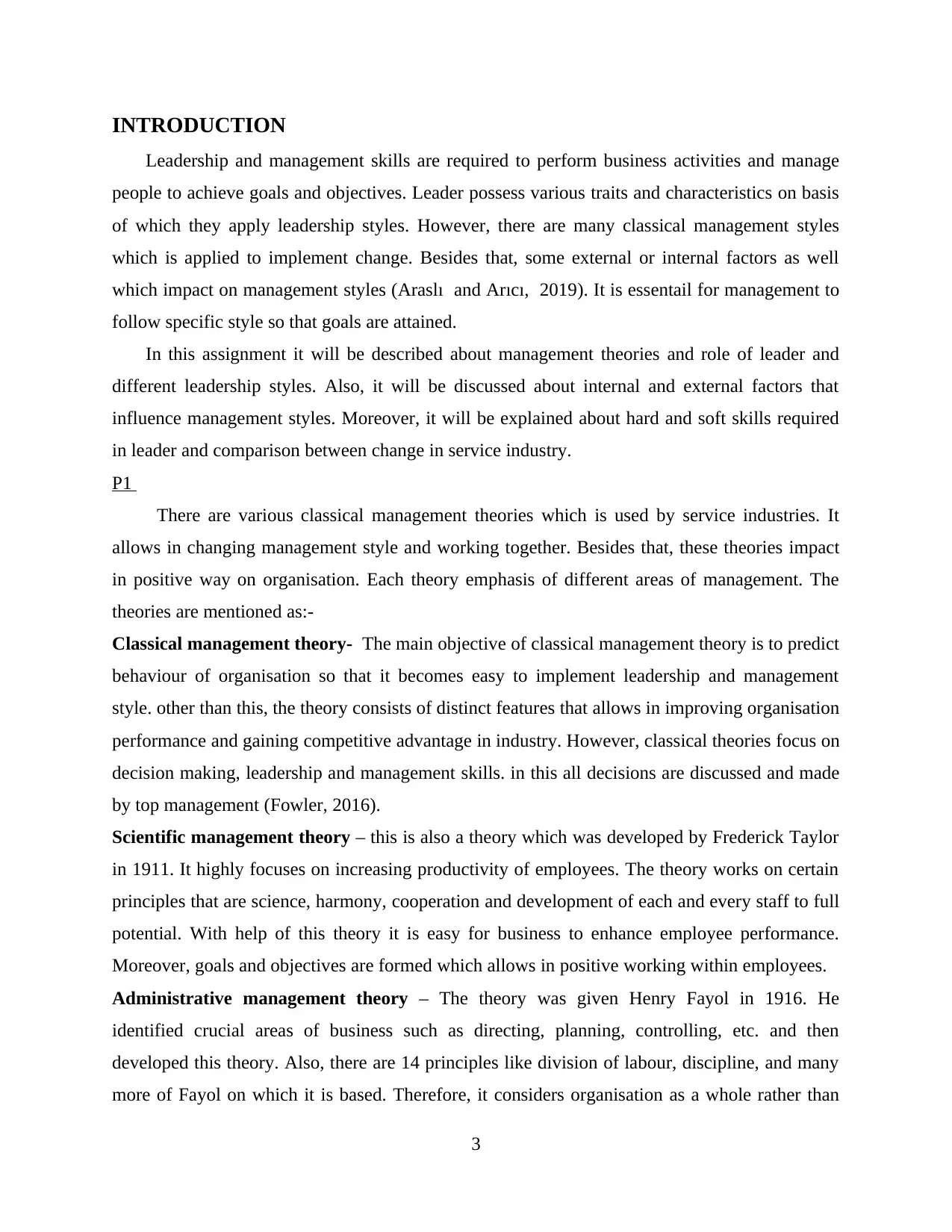
INTRODUCTION
Leadership and management skills are required to perform business activities and manage
people to achieve goals and objectives. Leader possess various traits and characteristics on basis
of which they apply leadership styles. However, there are many classical management styles
which is applied to implement change. Besides that, some external or internal factors as well
which impact on management styles (Araslı and Arıcı, 2019). It is essentail for management to
follow specific style so that goals are attained.
In this assignment it will be described about management theories and role of leader and
different leadership styles. Also, it will be discussed about internal and external factors that
influence management styles. Moreover, it will be explained about hard and soft skills required
in leader and comparison between change in service industry.
P1
There are various classical management theories which is used by service industries. It
allows in changing management style and working together. Besides that, these theories impact
in positive way on organisation. Each theory emphasis of different areas of management. The
theories are mentioned as:-
Classical management theory- The main objective of classical management theory is to predict
behaviour of organisation so that it becomes easy to implement leadership and management
style. other than this, the theory consists of distinct features that allows in improving organisation
performance and gaining competitive advantage in industry. However, classical theories focus on
decision making, leadership and management skills. in this all decisions are discussed and made
by top management (Fowler, 2016).
Scientific management theory – this is also a theory which was developed by Frederick Taylor
in 1911. It highly focuses on increasing productivity of employees. The theory works on certain
principles that are science, harmony, cooperation and development of each and every staff to full
potential. With help of this theory it is easy for business to enhance employee performance.
Moreover, goals and objectives are formed which allows in positive working within employees.
Administrative management theory – The theory was given Henry Fayol in 1916. He
identified crucial areas of business such as directing, planning, controlling, etc. and then
developed this theory. Also, there are 14 principles like division of labour, discipline, and many
more of Fayol on which it is based. Therefore, it considers organisation as a whole rather than
3
Leadership and management skills are required to perform business activities and manage
people to achieve goals and objectives. Leader possess various traits and characteristics on basis
of which they apply leadership styles. However, there are many classical management styles
which is applied to implement change. Besides that, some external or internal factors as well
which impact on management styles (Araslı and Arıcı, 2019). It is essentail for management to
follow specific style so that goals are attained.
In this assignment it will be described about management theories and role of leader and
different leadership styles. Also, it will be discussed about internal and external factors that
influence management styles. Moreover, it will be explained about hard and soft skills required
in leader and comparison between change in service industry.
P1
There are various classical management theories which is used by service industries. It
allows in changing management style and working together. Besides that, these theories impact
in positive way on organisation. Each theory emphasis of different areas of management. The
theories are mentioned as:-
Classical management theory- The main objective of classical management theory is to predict
behaviour of organisation so that it becomes easy to implement leadership and management
style. other than this, the theory consists of distinct features that allows in improving organisation
performance and gaining competitive advantage in industry. However, classical theories focus on
decision making, leadership and management skills. in this all decisions are discussed and made
by top management (Fowler, 2016).
Scientific management theory – this is also a theory which was developed by Frederick Taylor
in 1911. It highly focuses on increasing productivity of employees. The theory works on certain
principles that are science, harmony, cooperation and development of each and every staff to full
potential. With help of this theory it is easy for business to enhance employee performance.
Moreover, goals and objectives are formed which allows in positive working within employees.
Administrative management theory – The theory was given Henry Fayol in 1916. He
identified crucial areas of business such as directing, planning, controlling, etc. and then
developed this theory. Also, there are 14 principles like division of labour, discipline, and many
more of Fayol on which it is based. Therefore, it considers organisation as a whole rather than
3
⊘ This is a preview!⊘
Do you want full access?
Subscribe today to unlock all pages.

Trusted by 1+ million students worldwide
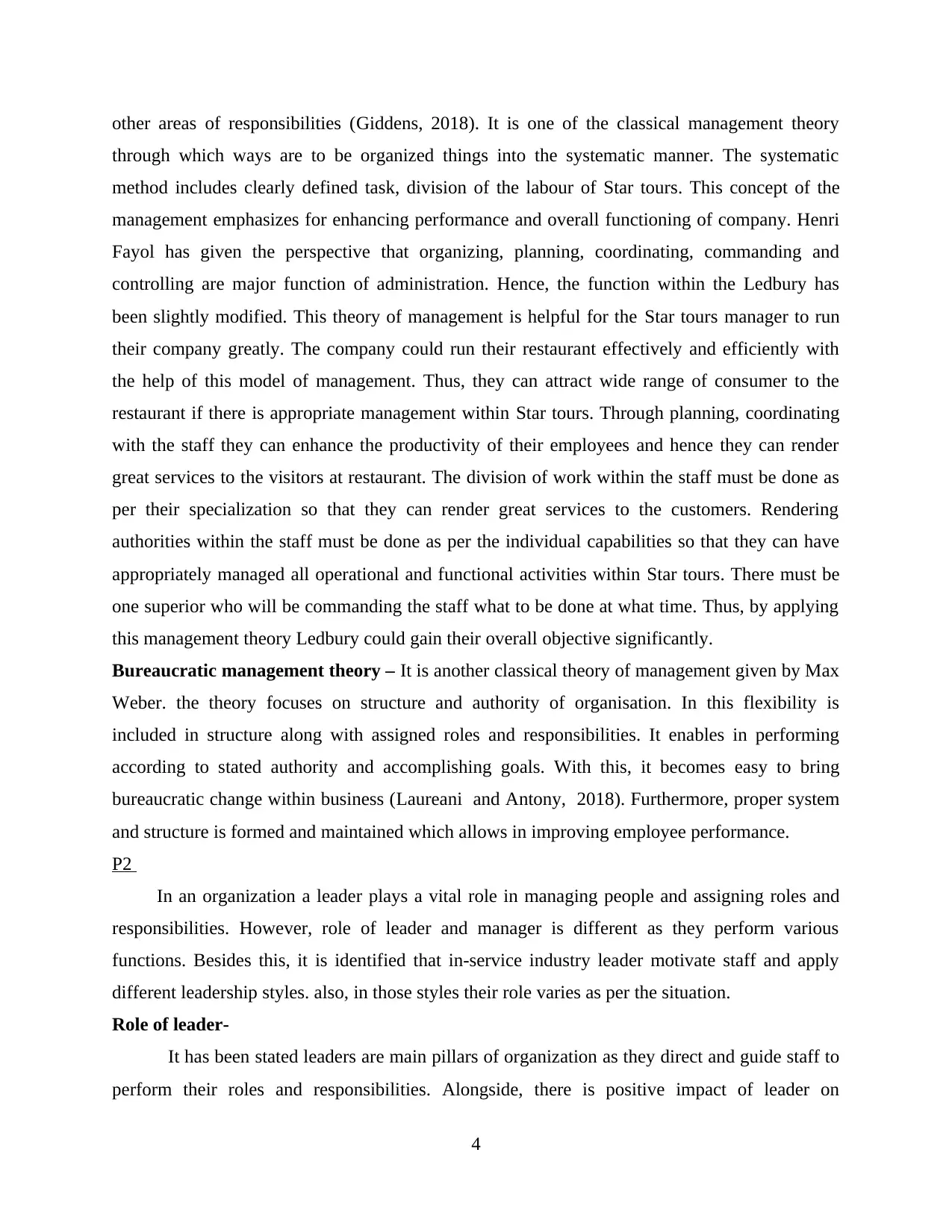
other areas of responsibilities (Giddens, 2018). It is one of the classical management theory
through which ways are to be organized things into the systematic manner. The systematic
method includes clearly defined task, division of the labour of Star tours. This concept of the
management emphasizes for enhancing performance and overall functioning of company. Henri
Fayol has given the perspective that organizing, planning, coordinating, commanding and
controlling are major function of administration. Hence, the function within the Ledbury has
been slightly modified. This theory of management is helpful for the Star tours manager to run
their company greatly. The company could run their restaurant effectively and efficiently with
the help of this model of management. Thus, they can attract wide range of consumer to the
restaurant if there is appropriate management within Star tours. Through planning, coordinating
with the staff they can enhance the productivity of their employees and hence they can render
great services to the visitors at restaurant. The division of work within the staff must be done as
per their specialization so that they can render great services to the customers. Rendering
authorities within the staff must be done as per the individual capabilities so that they can have
appropriately managed all operational and functional activities within Star tours. There must be
one superior who will be commanding the staff what to be done at what time. Thus, by applying
this management theory Ledbury could gain their overall objective significantly.
Bureaucratic management theory – It is another classical theory of management given by Max
Weber. the theory focuses on structure and authority of organisation. In this flexibility is
included in structure along with assigned roles and responsibilities. It enables in performing
according to stated authority and accomplishing goals. With this, it becomes easy to bring
bureaucratic change within business (Laureani and Antony, 2018). Furthermore, proper system
and structure is formed and maintained which allows in improving employee performance.
P2
In an organization a leader plays a vital role in managing people and assigning roles and
responsibilities. However, role of leader and manager is different as they perform various
functions. Besides this, it is identified that in-service industry leader motivate staff and apply
different leadership styles. also, in those styles their role varies as per the situation.
Role of leader-
It has been stated leaders are main pillars of organization as they direct and guide staff to
perform their roles and responsibilities. Alongside, there is positive impact of leader on
4
through which ways are to be organized things into the systematic manner. The systematic
method includes clearly defined task, division of the labour of Star tours. This concept of the
management emphasizes for enhancing performance and overall functioning of company. Henri
Fayol has given the perspective that organizing, planning, coordinating, commanding and
controlling are major function of administration. Hence, the function within the Ledbury has
been slightly modified. This theory of management is helpful for the Star tours manager to run
their company greatly. The company could run their restaurant effectively and efficiently with
the help of this model of management. Thus, they can attract wide range of consumer to the
restaurant if there is appropriate management within Star tours. Through planning, coordinating
with the staff they can enhance the productivity of their employees and hence they can render
great services to the visitors at restaurant. The division of work within the staff must be done as
per their specialization so that they can render great services to the customers. Rendering
authorities within the staff must be done as per the individual capabilities so that they can have
appropriately managed all operational and functional activities within Star tours. There must be
one superior who will be commanding the staff what to be done at what time. Thus, by applying
this management theory Ledbury could gain their overall objective significantly.
Bureaucratic management theory – It is another classical theory of management given by Max
Weber. the theory focuses on structure and authority of organisation. In this flexibility is
included in structure along with assigned roles and responsibilities. It enables in performing
according to stated authority and accomplishing goals. With this, it becomes easy to bring
bureaucratic change within business (Laureani and Antony, 2018). Furthermore, proper system
and structure is formed and maintained which allows in improving employee performance.
P2
In an organization a leader plays a vital role in managing people and assigning roles and
responsibilities. However, role of leader and manager is different as they perform various
functions. Besides this, it is identified that in-service industry leader motivate staff and apply
different leadership styles. also, in those styles their role varies as per the situation.
Role of leader-
It has been stated leaders are main pillars of organization as they direct and guide staff to
perform their roles and responsibilities. Alongside, there is positive impact of leader on
4
Paraphrase This Document
Need a fresh take? Get an instant paraphrase of this document with our AI Paraphraser
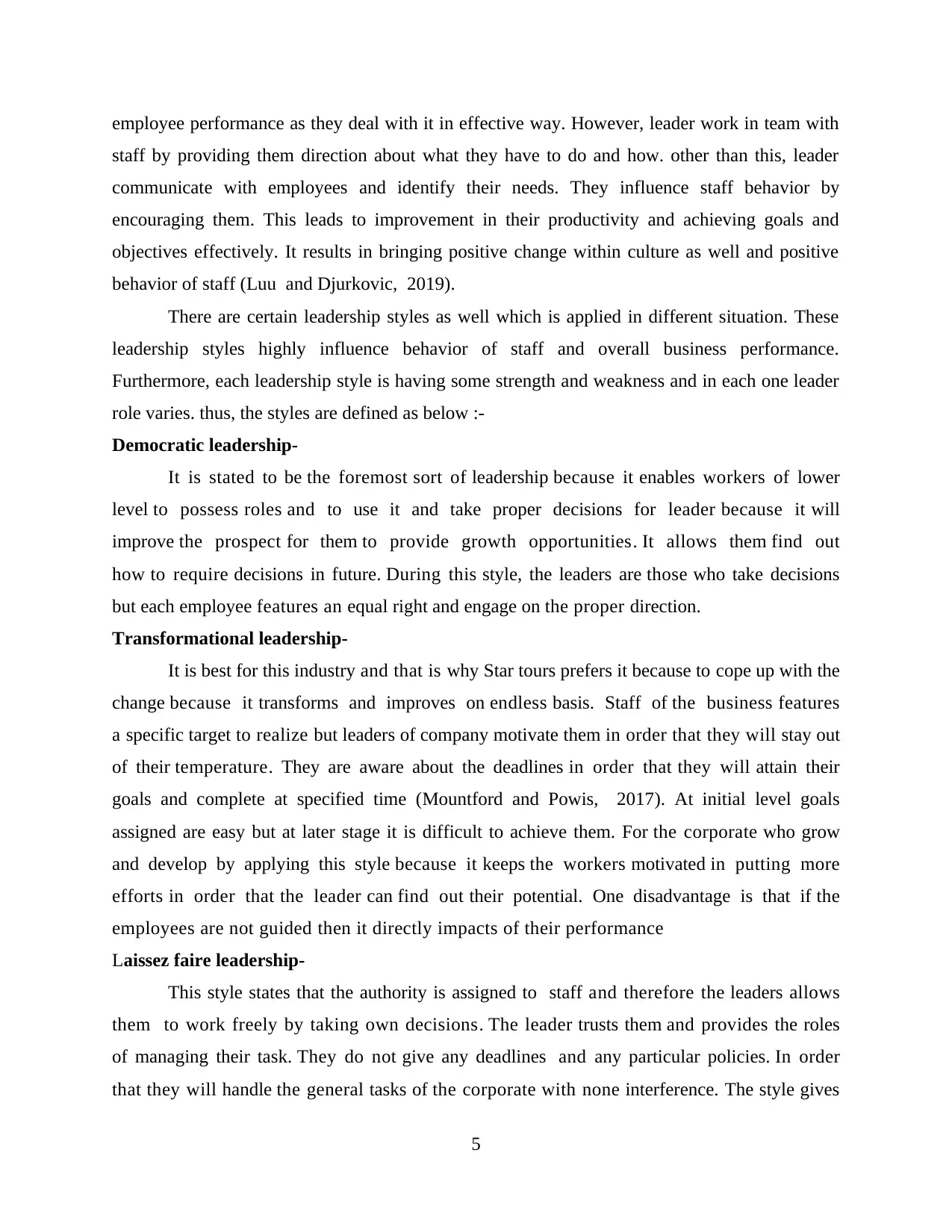
employee performance as they deal with it in effective way. However, leader work in team with
staff by providing them direction about what they have to do and how. other than this, leader
communicate with employees and identify their needs. They influence staff behavior by
encouraging them. This leads to improvement in their productivity and achieving goals and
objectives effectively. It results in bringing positive change within culture as well and positive
behavior of staff (Luu and Djurkovic, 2019).
There are certain leadership styles as well which is applied in different situation. These
leadership styles highly influence behavior of staff and overall business performance.
Furthermore, each leadership style is having some strength and weakness and in each one leader
role varies. thus, the styles are defined as below :-
Democratic leadership-
It is stated to be the foremost sort of leadership because it enables workers of lower
level to possess roles and to use it and take proper decisions for leader because it will
improve the prospect for them to provide growth opportunities. It allows them find out
how to require decisions in future. During this style, the leaders are those who take decisions
but each employee features an equal right and engage on the proper direction.
Transformational leadership-
It is best for this industry and that is why Star tours prefers it because to cope up with the
change because it transforms and improves on endless basis. Staff of the business features
a specific target to realize but leaders of company motivate them in order that they will stay out
of their temperature. They are aware about the deadlines in order that they will attain their
goals and complete at specified time (Mountford and Powis, 2017). At initial level goals
assigned are easy but at later stage it is difficult to achieve them. For the corporate who grow
and develop by applying this style because it keeps the workers motivated in putting more
efforts in order that the leader can find out their potential. One disadvantage is that if the
employees are not guided then it directly impacts of their performance
Laissez faire leadership-
This style states that the authority is assigned to staff and therefore the leaders allows
them to work freely by taking own decisions. The leader trusts them and provides the roles
of managing their task. They do not give any deadlines and any particular policies. In order
that they will handle the general tasks of the corporate with none interference. The style gives
5
staff by providing them direction about what they have to do and how. other than this, leader
communicate with employees and identify their needs. They influence staff behavior by
encouraging them. This leads to improvement in their productivity and achieving goals and
objectives effectively. It results in bringing positive change within culture as well and positive
behavior of staff (Luu and Djurkovic, 2019).
There are certain leadership styles as well which is applied in different situation. These
leadership styles highly influence behavior of staff and overall business performance.
Furthermore, each leadership style is having some strength and weakness and in each one leader
role varies. thus, the styles are defined as below :-
Democratic leadership-
It is stated to be the foremost sort of leadership because it enables workers of lower
level to possess roles and to use it and take proper decisions for leader because it will
improve the prospect for them to provide growth opportunities. It allows them find out
how to require decisions in future. During this style, the leaders are those who take decisions
but each employee features an equal right and engage on the proper direction.
Transformational leadership-
It is best for this industry and that is why Star tours prefers it because to cope up with the
change because it transforms and improves on endless basis. Staff of the business features
a specific target to realize but leaders of company motivate them in order that they will stay out
of their temperature. They are aware about the deadlines in order that they will attain their
goals and complete at specified time (Mountford and Powis, 2017). At initial level goals
assigned are easy but at later stage it is difficult to achieve them. For the corporate who grow
and develop by applying this style because it keeps the workers motivated in putting more
efforts in order that the leader can find out their potential. One disadvantage is that if the
employees are not guided then it directly impacts of their performance
Laissez faire leadership-
This style states that the authority is assigned to staff and therefore the leaders allows
them to work freely by taking own decisions. The leader trusts them and provides the roles
of managing their task. They do not give any deadlines and any particular policies. In order
that they will handle the general tasks of the corporate with none interference. The style gives
5
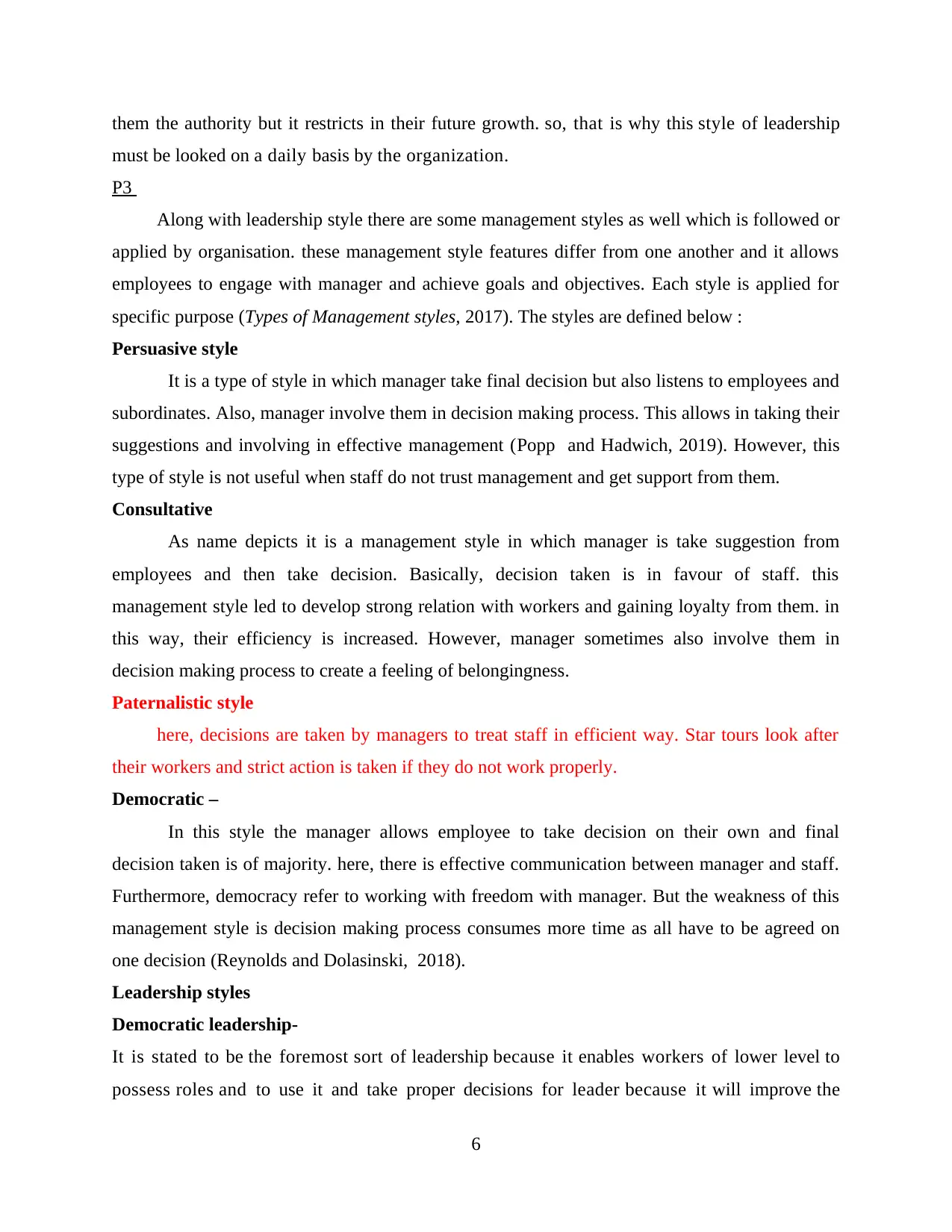
them the authority but it restricts in their future growth. so, that is why this style of leadership
must be looked on a daily basis by the organization.
P3
Along with leadership style there are some management styles as well which is followed or
applied by organisation. these management style features differ from one another and it allows
employees to engage with manager and achieve goals and objectives. Each style is applied for
specific purpose (Types of Management styles, 2017). The styles are defined below :
Persuasive style
It is a type of style in which manager take final decision but also listens to employees and
subordinates. Also, manager involve them in decision making process. This allows in taking their
suggestions and involving in effective management (Popp and Hadwich, 2019). However, this
type of style is not useful when staff do not trust management and get support from them.
Consultative
As name depicts it is a management style in which manager is take suggestion from
employees and then take decision. Basically, decision taken is in favour of staff. this
management style led to develop strong relation with workers and gaining loyalty from them. in
this way, their efficiency is increased. However, manager sometimes also involve them in
decision making process to create a feeling of belongingness.
Paternalistic style
here, decisions are taken by managers to treat staff in efficient way. Star tours look after
their workers and strict action is taken if they do not work properly.
Democratic –
In this style the manager allows employee to take decision on their own and final
decision taken is of majority. here, there is effective communication between manager and staff.
Furthermore, democracy refer to working with freedom with manager. But the weakness of this
management style is decision making process consumes more time as all have to be agreed on
one decision (Reynolds and Dolasinski, 2018).
Leadership styles
Democratic leadership-
It is stated to be the foremost sort of leadership because it enables workers of lower level to
possess roles and to use it and take proper decisions for leader because it will improve the
6
must be looked on a daily basis by the organization.
P3
Along with leadership style there are some management styles as well which is followed or
applied by organisation. these management style features differ from one another and it allows
employees to engage with manager and achieve goals and objectives. Each style is applied for
specific purpose (Types of Management styles, 2017). The styles are defined below :
Persuasive style
It is a type of style in which manager take final decision but also listens to employees and
subordinates. Also, manager involve them in decision making process. This allows in taking their
suggestions and involving in effective management (Popp and Hadwich, 2019). However, this
type of style is not useful when staff do not trust management and get support from them.
Consultative
As name depicts it is a management style in which manager is take suggestion from
employees and then take decision. Basically, decision taken is in favour of staff. this
management style led to develop strong relation with workers and gaining loyalty from them. in
this way, their efficiency is increased. However, manager sometimes also involve them in
decision making process to create a feeling of belongingness.
Paternalistic style
here, decisions are taken by managers to treat staff in efficient way. Star tours look after
their workers and strict action is taken if they do not work properly.
Democratic –
In this style the manager allows employee to take decision on their own and final
decision taken is of majority. here, there is effective communication between manager and staff.
Furthermore, democracy refer to working with freedom with manager. But the weakness of this
management style is decision making process consumes more time as all have to be agreed on
one decision (Reynolds and Dolasinski, 2018).
Leadership styles
Democratic leadership-
It is stated to be the foremost sort of leadership because it enables workers of lower level to
possess roles and to use it and take proper decisions for leader because it will improve the
6
⊘ This is a preview!⊘
Do you want full access?
Subscribe today to unlock all pages.

Trusted by 1+ million students worldwide
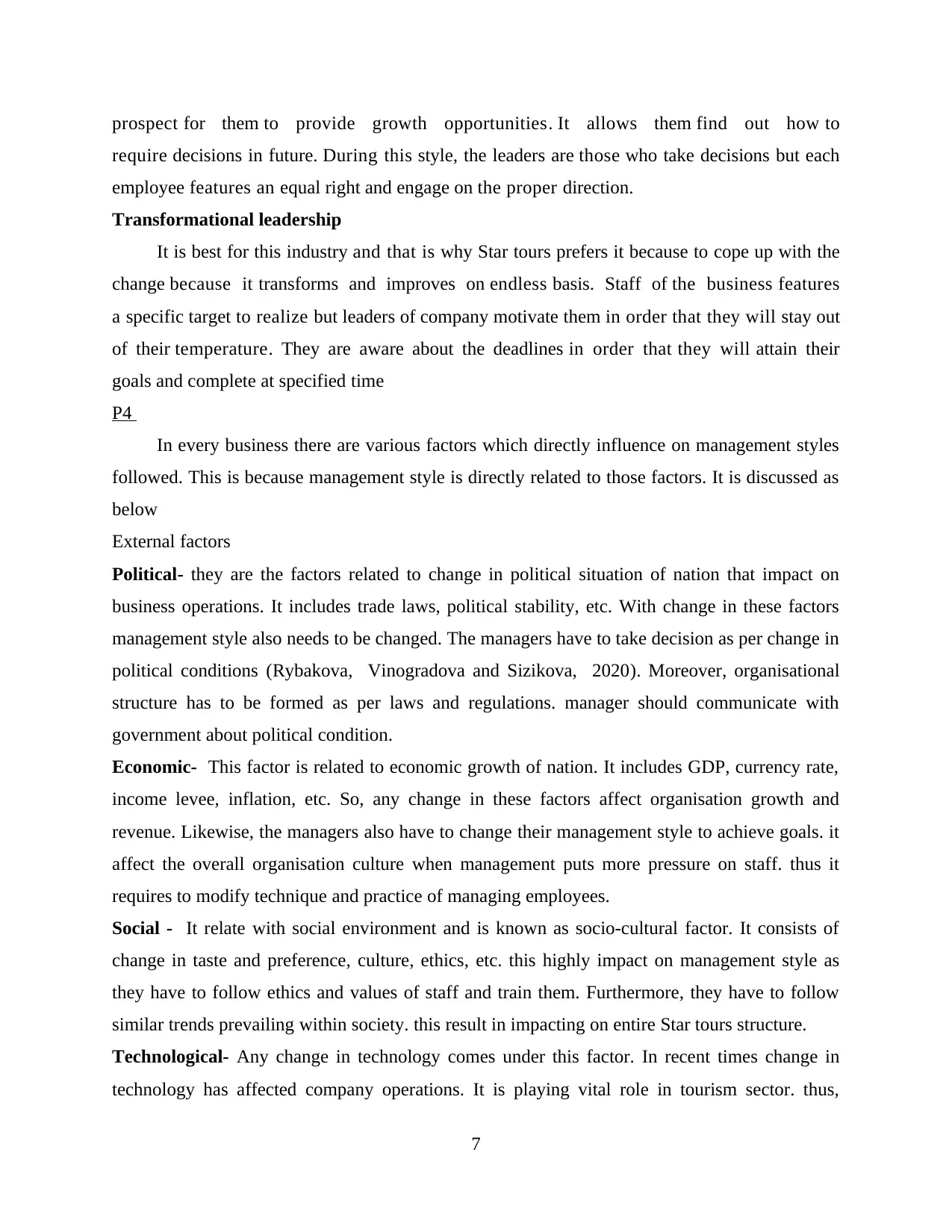
prospect for them to provide growth opportunities. It allows them find out how to
require decisions in future. During this style, the leaders are those who take decisions but each
employee features an equal right and engage on the proper direction.
Transformational leadership
It is best for this industry and that is why Star tours prefers it because to cope up with the
change because it transforms and improves on endless basis. Staff of the business features
a specific target to realize but leaders of company motivate them in order that they will stay out
of their temperature. They are aware about the deadlines in order that they will attain their
goals and complete at specified time
P4
In every business there are various factors which directly influence on management styles
followed. This is because management style is directly related to those factors. It is discussed as
below
External factors
Political- they are the factors related to change in political situation of nation that impact on
business operations. It includes trade laws, political stability, etc. With change in these factors
management style also needs to be changed. The managers have to take decision as per change in
political conditions (Rybakova, Vinogradova and Sizikova, 2020). Moreover, organisational
structure has to be formed as per laws and regulations. manager should communicate with
government about political condition.
Economic- This factor is related to economic growth of nation. It includes GDP, currency rate,
income levee, inflation, etc. So, any change in these factors affect organisation growth and
revenue. Likewise, the managers also have to change their management style to achieve goals. it
affect the overall organisation culture when management puts more pressure on staff. thus it
requires to modify technique and practice of managing employees.
Social - It relate with social environment and is known as socio-cultural factor. It consists of
change in taste and preference, culture, ethics, etc. this highly impact on management style as
they have to follow ethics and values of staff and train them. Furthermore, they have to follow
similar trends prevailing within society. this result in impacting on entire Star tours structure.
Technological- Any change in technology comes under this factor. In recent times change in
technology has affected company operations. It is playing vital role in tourism sector. thus,
7
require decisions in future. During this style, the leaders are those who take decisions but each
employee features an equal right and engage on the proper direction.
Transformational leadership
It is best for this industry and that is why Star tours prefers it because to cope up with the
change because it transforms and improves on endless basis. Staff of the business features
a specific target to realize but leaders of company motivate them in order that they will stay out
of their temperature. They are aware about the deadlines in order that they will attain their
goals and complete at specified time
P4
In every business there are various factors which directly influence on management styles
followed. This is because management style is directly related to those factors. It is discussed as
below
External factors
Political- they are the factors related to change in political situation of nation that impact on
business operations. It includes trade laws, political stability, etc. With change in these factors
management style also needs to be changed. The managers have to take decision as per change in
political conditions (Rybakova, Vinogradova and Sizikova, 2020). Moreover, organisational
structure has to be formed as per laws and regulations. manager should communicate with
government about political condition.
Economic- This factor is related to economic growth of nation. It includes GDP, currency rate,
income levee, inflation, etc. So, any change in these factors affect organisation growth and
revenue. Likewise, the managers also have to change their management style to achieve goals. it
affect the overall organisation culture when management puts more pressure on staff. thus it
requires to modify technique and practice of managing employees.
Social - It relate with social environment and is known as socio-cultural factor. It consists of
change in taste and preference, culture, ethics, etc. this highly impact on management style as
they have to follow ethics and values of staff and train them. Furthermore, they have to follow
similar trends prevailing within society. this result in impacting on entire Star tours structure.
Technological- Any change in technology comes under this factor. In recent times change in
technology has affected company operations. It is playing vital role in tourism sector. thus,
7
Paraphrase This Document
Need a fresh take? Get an instant paraphrase of this document with our AI Paraphraser
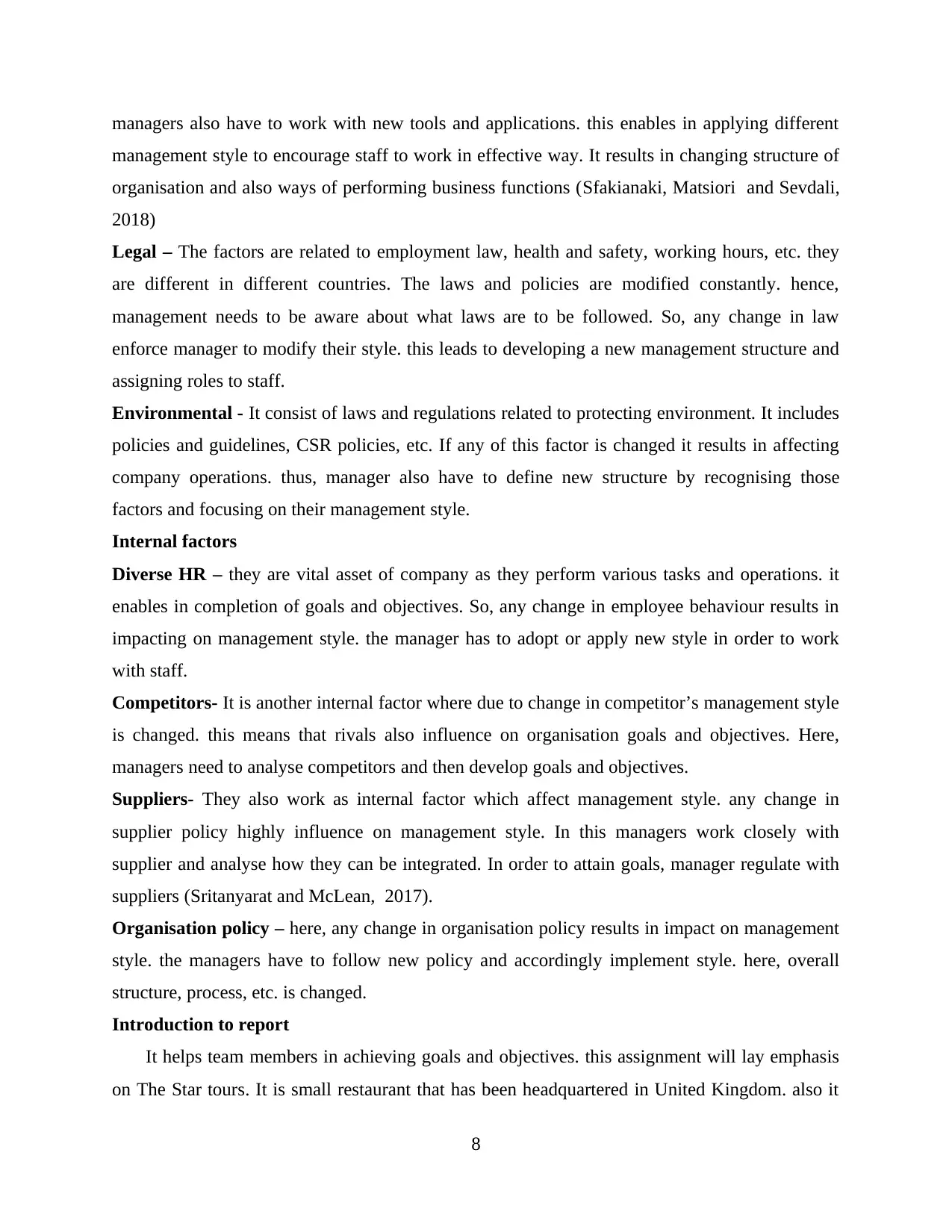
managers also have to work with new tools and applications. this enables in applying different
management style to encourage staff to work in effective way. It results in changing structure of
organisation and also ways of performing business functions (Sfakianaki, Matsiori and Sevdali,
2018)
Legal – The factors are related to employment law, health and safety, working hours, etc. they
are different in different countries. The laws and policies are modified constantly. hence,
management needs to be aware about what laws are to be followed. So, any change in law
enforce manager to modify their style. this leads to developing a new management structure and
assigning roles to staff.
Environmental - It consist of laws and regulations related to protecting environment. It includes
policies and guidelines, CSR policies, etc. If any of this factor is changed it results in affecting
company operations. thus, manager also have to define new structure by recognising those
factors and focusing on their management style.
Internal factors
Diverse HR – they are vital asset of company as they perform various tasks and operations. it
enables in completion of goals and objectives. So, any change in employee behaviour results in
impacting on management style. the manager has to adopt or apply new style in order to work
with staff.
Competitors- It is another internal factor where due to change in competitor’s management style
is changed. this means that rivals also influence on organisation goals and objectives. Here,
managers need to analyse competitors and then develop goals and objectives.
Suppliers- They also work as internal factor which affect management style. any change in
supplier policy highly influence on management style. In this managers work closely with
supplier and analyse how they can be integrated. In order to attain goals, manager regulate with
suppliers (Sritanyarat and McLean, 2017).
Organisation policy – here, any change in organisation policy results in impact on management
style. the managers have to follow new policy and accordingly implement style. here, overall
structure, process, etc. is changed.
Introduction to report
It helps team members in achieving goals and objectives. this assignment will lay emphasis
on The Star tours. It is small restaurant that has been headquartered in United Kingdom. also it
8
management style to encourage staff to work in effective way. It results in changing structure of
organisation and also ways of performing business functions (Sfakianaki, Matsiori and Sevdali,
2018)
Legal – The factors are related to employment law, health and safety, working hours, etc. they
are different in different countries. The laws and policies are modified constantly. hence,
management needs to be aware about what laws are to be followed. So, any change in law
enforce manager to modify their style. this leads to developing a new management structure and
assigning roles to staff.
Environmental - It consist of laws and regulations related to protecting environment. It includes
policies and guidelines, CSR policies, etc. If any of this factor is changed it results in affecting
company operations. thus, manager also have to define new structure by recognising those
factors and focusing on their management style.
Internal factors
Diverse HR – they are vital asset of company as they perform various tasks and operations. it
enables in completion of goals and objectives. So, any change in employee behaviour results in
impacting on management style. the manager has to adopt or apply new style in order to work
with staff.
Competitors- It is another internal factor where due to change in competitor’s management style
is changed. this means that rivals also influence on organisation goals and objectives. Here,
managers need to analyse competitors and then develop goals and objectives.
Suppliers- They also work as internal factor which affect management style. any change in
supplier policy highly influence on management style. In this managers work closely with
supplier and analyse how they can be integrated. In order to attain goals, manager regulate with
suppliers (Sritanyarat and McLean, 2017).
Organisation policy – here, any change in organisation policy results in impact on management
style. the managers have to follow new policy and accordingly implement style. here, overall
structure, process, etc. is changed.
Introduction to report
It helps team members in achieving goals and objectives. this assignment will lay emphasis
on The Star tours. It is small restaurant that has been headquartered in United Kingdom. also it
8
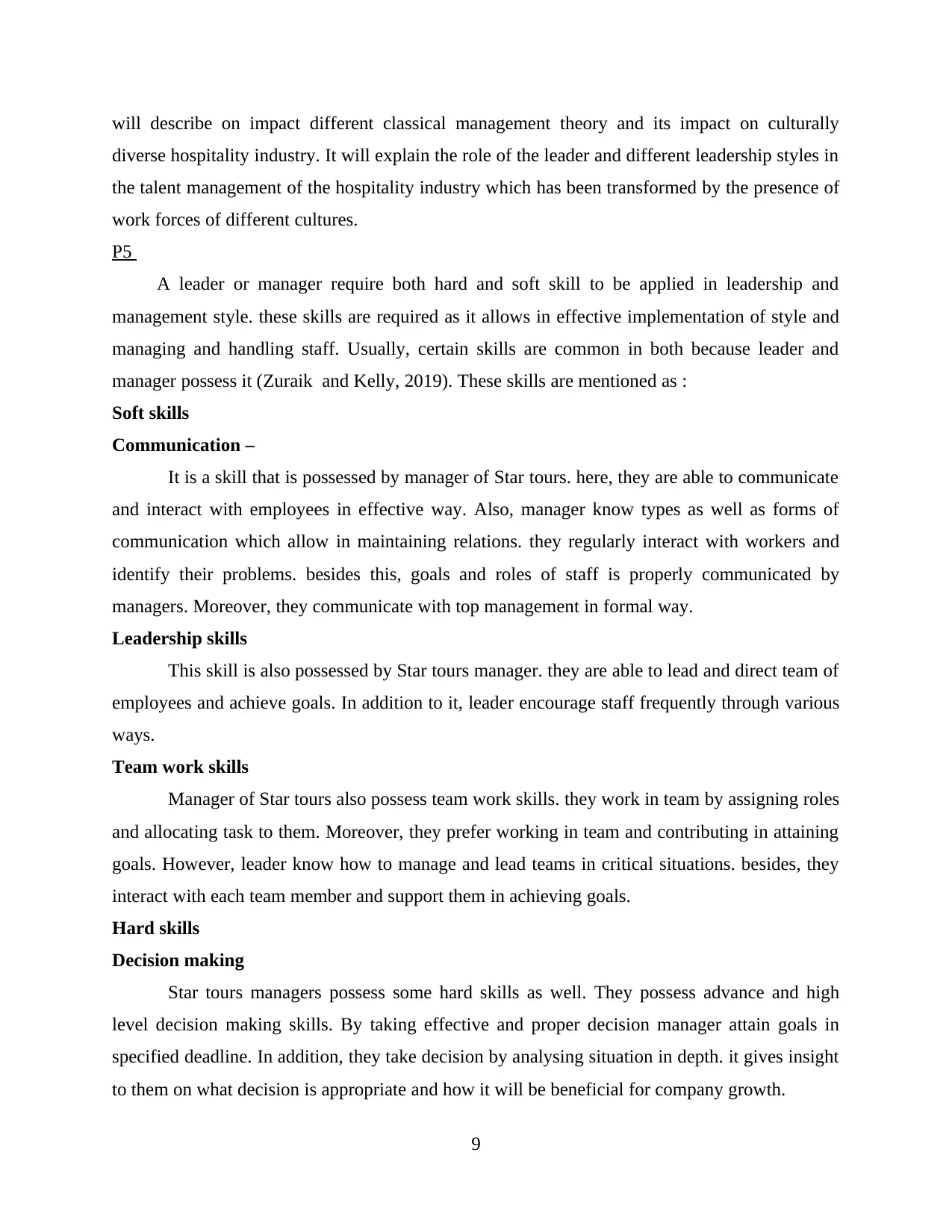
will describe on impact different classical management theory and its impact on culturally
diverse hospitality industry. It will explain the role of the leader and different leadership styles in
the talent management of the hospitality industry which has been transformed by the presence of
work forces of different cultures.
P5
A leader or manager require both hard and soft skill to be applied in leadership and
management style. these skills are required as it allows in effective implementation of style and
managing and handling staff. Usually, certain skills are common in both because leader and
manager possess it (Zuraik and Kelly, 2019). These skills are mentioned as :
Soft skills
Communication –
It is a skill that is possessed by manager of Star tours. here, they are able to communicate
and interact with employees in effective way. Also, manager know types as well as forms of
communication which allow in maintaining relations. they regularly interact with workers and
identify their problems. besides this, goals and roles of staff is properly communicated by
managers. Moreover, they communicate with top management in formal way.
Leadership skills
This skill is also possessed by Star tours manager. they are able to lead and direct team of
employees and achieve goals. In addition to it, leader encourage staff frequently through various
ways.
Team work skills
Manager of Star tours also possess team work skills. they work in team by assigning roles
and allocating task to them. Moreover, they prefer working in team and contributing in attaining
goals. However, leader know how to manage and lead teams in critical situations. besides, they
interact with each team member and support them in achieving goals.
Hard skills
Decision making
Star tours managers possess some hard skills as well. They possess advance and high
level decision making skills. By taking effective and proper decision manager attain goals in
specified deadline. In addition, they take decision by analysing situation in depth. it gives insight
to them on what decision is appropriate and how it will be beneficial for company growth.
9
diverse hospitality industry. It will explain the role of the leader and different leadership styles in
the talent management of the hospitality industry which has been transformed by the presence of
work forces of different cultures.
P5
A leader or manager require both hard and soft skill to be applied in leadership and
management style. these skills are required as it allows in effective implementation of style and
managing and handling staff. Usually, certain skills are common in both because leader and
manager possess it (Zuraik and Kelly, 2019). These skills are mentioned as :
Soft skills
Communication –
It is a skill that is possessed by manager of Star tours. here, they are able to communicate
and interact with employees in effective way. Also, manager know types as well as forms of
communication which allow in maintaining relations. they regularly interact with workers and
identify their problems. besides this, goals and roles of staff is properly communicated by
managers. Moreover, they communicate with top management in formal way.
Leadership skills
This skill is also possessed by Star tours manager. they are able to lead and direct team of
employees and achieve goals. In addition to it, leader encourage staff frequently through various
ways.
Team work skills
Manager of Star tours also possess team work skills. they work in team by assigning roles
and allocating task to them. Moreover, they prefer working in team and contributing in attaining
goals. However, leader know how to manage and lead teams in critical situations. besides, they
interact with each team member and support them in achieving goals.
Hard skills
Decision making
Star tours managers possess some hard skills as well. They possess advance and high
level decision making skills. By taking effective and proper decision manager attain goals in
specified deadline. In addition, they take decision by analysing situation in depth. it gives insight
to them on what decision is appropriate and how it will be beneficial for company growth.
9
⊘ This is a preview!⊘
Do you want full access?
Subscribe today to unlock all pages.

Trusted by 1+ million students worldwide
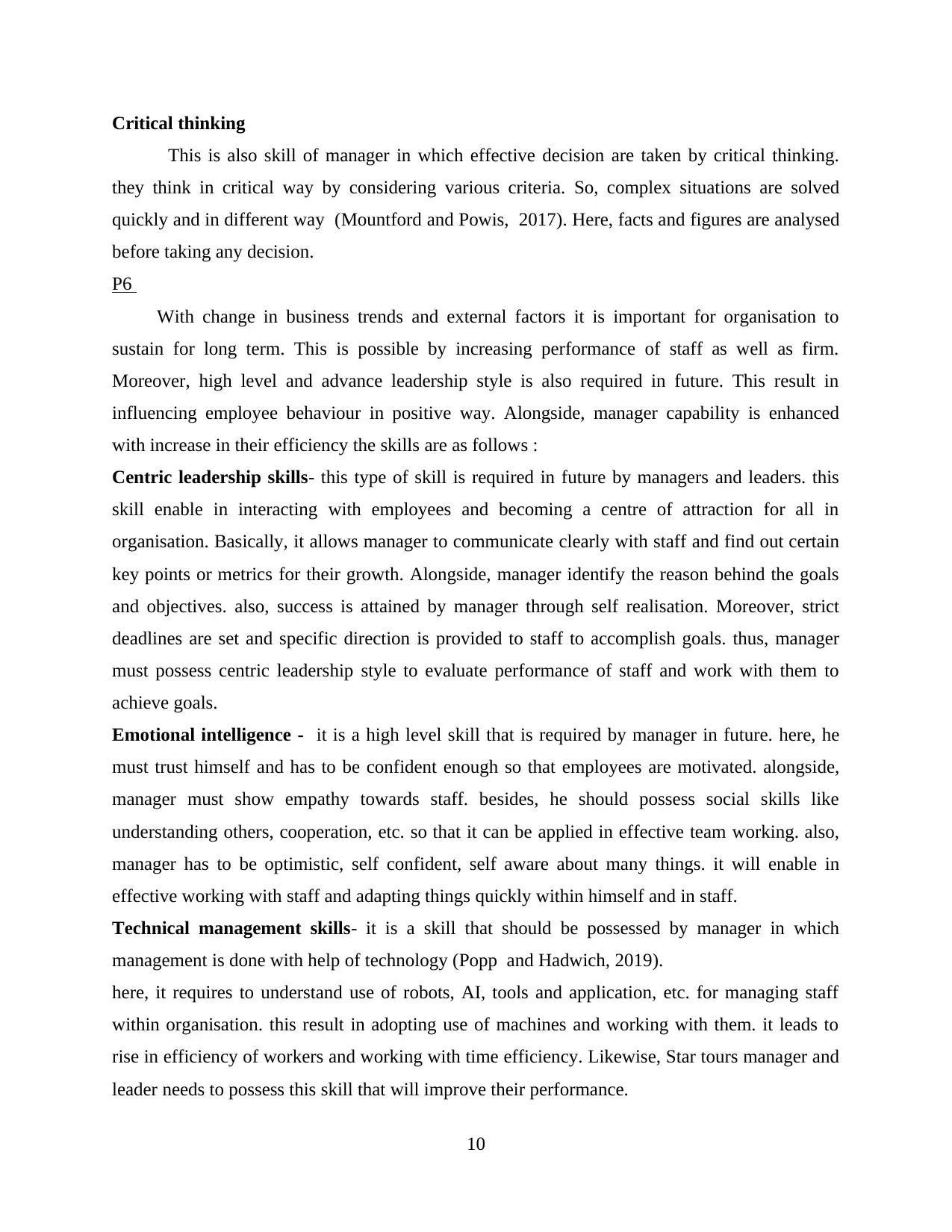
Critical thinking
This is also skill of manager in which effective decision are taken by critical thinking.
they think in critical way by considering various criteria. So, complex situations are solved
quickly and in different way (Mountford and Powis, 2017). Here, facts and figures are analysed
before taking any decision.
P6
With change in business trends and external factors it is important for organisation to
sustain for long term. This is possible by increasing performance of staff as well as firm.
Moreover, high level and advance leadership style is also required in future. This result in
influencing employee behaviour in positive way. Alongside, manager capability is enhanced
with increase in their efficiency the skills are as follows :
Centric leadership skills- this type of skill is required in future by managers and leaders. this
skill enable in interacting with employees and becoming a centre of attraction for all in
organisation. Basically, it allows manager to communicate clearly with staff and find out certain
key points or metrics for their growth. Alongside, manager identify the reason behind the goals
and objectives. also, success is attained by manager through self realisation. Moreover, strict
deadlines are set and specific direction is provided to staff to accomplish goals. thus, manager
must possess centric leadership style to evaluate performance of staff and work with them to
achieve goals.
Emotional intelligence - it is a high level skill that is required by manager in future. here, he
must trust himself and has to be confident enough so that employees are motivated. alongside,
manager must show empathy towards staff. besides, he should possess social skills like
understanding others, cooperation, etc. so that it can be applied in effective team working. also,
manager has to be optimistic, self confident, self aware about many things. it will enable in
effective working with staff and adapting things quickly within himself and in staff.
Technical management skills- it is a skill that should be possessed by manager in which
management is done with help of technology (Popp and Hadwich, 2019).
here, it requires to understand use of robots, AI, tools and application, etc. for managing staff
within organisation. this result in adopting use of machines and working with them. it leads to
rise in efficiency of workers and working with time efficiency. Likewise, Star tours manager and
leader needs to possess this skill that will improve their performance.
10
This is also skill of manager in which effective decision are taken by critical thinking.
they think in critical way by considering various criteria. So, complex situations are solved
quickly and in different way (Mountford and Powis, 2017). Here, facts and figures are analysed
before taking any decision.
P6
With change in business trends and external factors it is important for organisation to
sustain for long term. This is possible by increasing performance of staff as well as firm.
Moreover, high level and advance leadership style is also required in future. This result in
influencing employee behaviour in positive way. Alongside, manager capability is enhanced
with increase in their efficiency the skills are as follows :
Centric leadership skills- this type of skill is required in future by managers and leaders. this
skill enable in interacting with employees and becoming a centre of attraction for all in
organisation. Basically, it allows manager to communicate clearly with staff and find out certain
key points or metrics for their growth. Alongside, manager identify the reason behind the goals
and objectives. also, success is attained by manager through self realisation. Moreover, strict
deadlines are set and specific direction is provided to staff to accomplish goals. thus, manager
must possess centric leadership style to evaluate performance of staff and work with them to
achieve goals.
Emotional intelligence - it is a high level skill that is required by manager in future. here, he
must trust himself and has to be confident enough so that employees are motivated. alongside,
manager must show empathy towards staff. besides, he should possess social skills like
understanding others, cooperation, etc. so that it can be applied in effective team working. also,
manager has to be optimistic, self confident, self aware about many things. it will enable in
effective working with staff and adapting things quickly within himself and in staff.
Technical management skills- it is a skill that should be possessed by manager in which
management is done with help of technology (Popp and Hadwich, 2019).
here, it requires to understand use of robots, AI, tools and application, etc. for managing staff
within organisation. this result in adopting use of machines and working with them. it leads to
rise in efficiency of workers and working with time efficiency. Likewise, Star tours manager and
leader needs to possess this skill that will improve their performance.
10
Paraphrase This Document
Need a fresh take? Get an instant paraphrase of this document with our AI Paraphraser
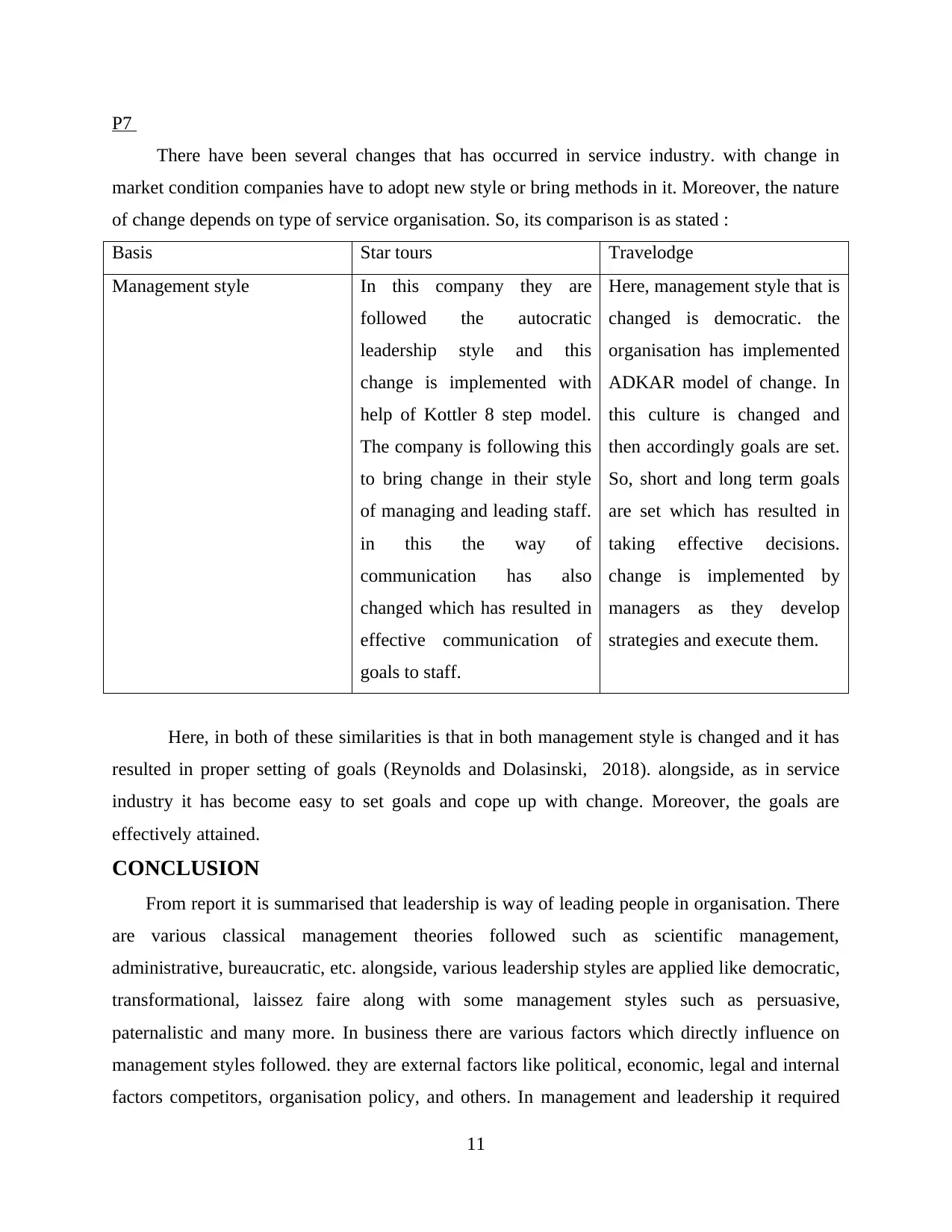
P7
There have been several changes that has occurred in service industry. with change in
market condition companies have to adopt new style or bring methods in it. Moreover, the nature
of change depends on type of service organisation. So, its comparison is as stated :
Basis Star tours Travelodge
Management style In this company they are
followed the autocratic
leadership style and this
change is implemented with
help of Kottler 8 step model.
The company is following this
to bring change in their style
of managing and leading staff.
in this the way of
communication has also
changed which has resulted in
effective communication of
goals to staff.
Here, management style that is
changed is democratic. the
organisation has implemented
ADKAR model of change. In
this culture is changed and
then accordingly goals are set.
So, short and long term goals
are set which has resulted in
taking effective decisions.
change is implemented by
managers as they develop
strategies and execute them.
Here, in both of these similarities is that in both management style is changed and it has
resulted in proper setting of goals (Reynolds and Dolasinski, 2018). alongside, as in service
industry it has become easy to set goals and cope up with change. Moreover, the goals are
effectively attained.
CONCLUSION
From report it is summarised that leadership is way of leading people in organisation. There
are various classical management theories followed such as scientific management,
administrative, bureaucratic, etc. alongside, various leadership styles are applied like democratic,
transformational, laissez faire along with some management styles such as persuasive,
paternalistic and many more. In business there are various factors which directly influence on
management styles followed. they are external factors like political, economic, legal and internal
factors competitors, organisation policy, and others. In management and leadership it required
11
There have been several changes that has occurred in service industry. with change in
market condition companies have to adopt new style or bring methods in it. Moreover, the nature
of change depends on type of service organisation. So, its comparison is as stated :
Basis Star tours Travelodge
Management style In this company they are
followed the autocratic
leadership style and this
change is implemented with
help of Kottler 8 step model.
The company is following this
to bring change in their style
of managing and leading staff.
in this the way of
communication has also
changed which has resulted in
effective communication of
goals to staff.
Here, management style that is
changed is democratic. the
organisation has implemented
ADKAR model of change. In
this culture is changed and
then accordingly goals are set.
So, short and long term goals
are set which has resulted in
taking effective decisions.
change is implemented by
managers as they develop
strategies and execute them.
Here, in both of these similarities is that in both management style is changed and it has
resulted in proper setting of goals (Reynolds and Dolasinski, 2018). alongside, as in service
industry it has become easy to set goals and cope up with change. Moreover, the goals are
effectively attained.
CONCLUSION
From report it is summarised that leadership is way of leading people in organisation. There
are various classical management theories followed such as scientific management,
administrative, bureaucratic, etc. alongside, various leadership styles are applied like democratic,
transformational, laissez faire along with some management styles such as persuasive,
paternalistic and many more. In business there are various factors which directly influence on
management styles followed. they are external factors like political, economic, legal and internal
factors competitors, organisation policy, and others. In management and leadership it required
11
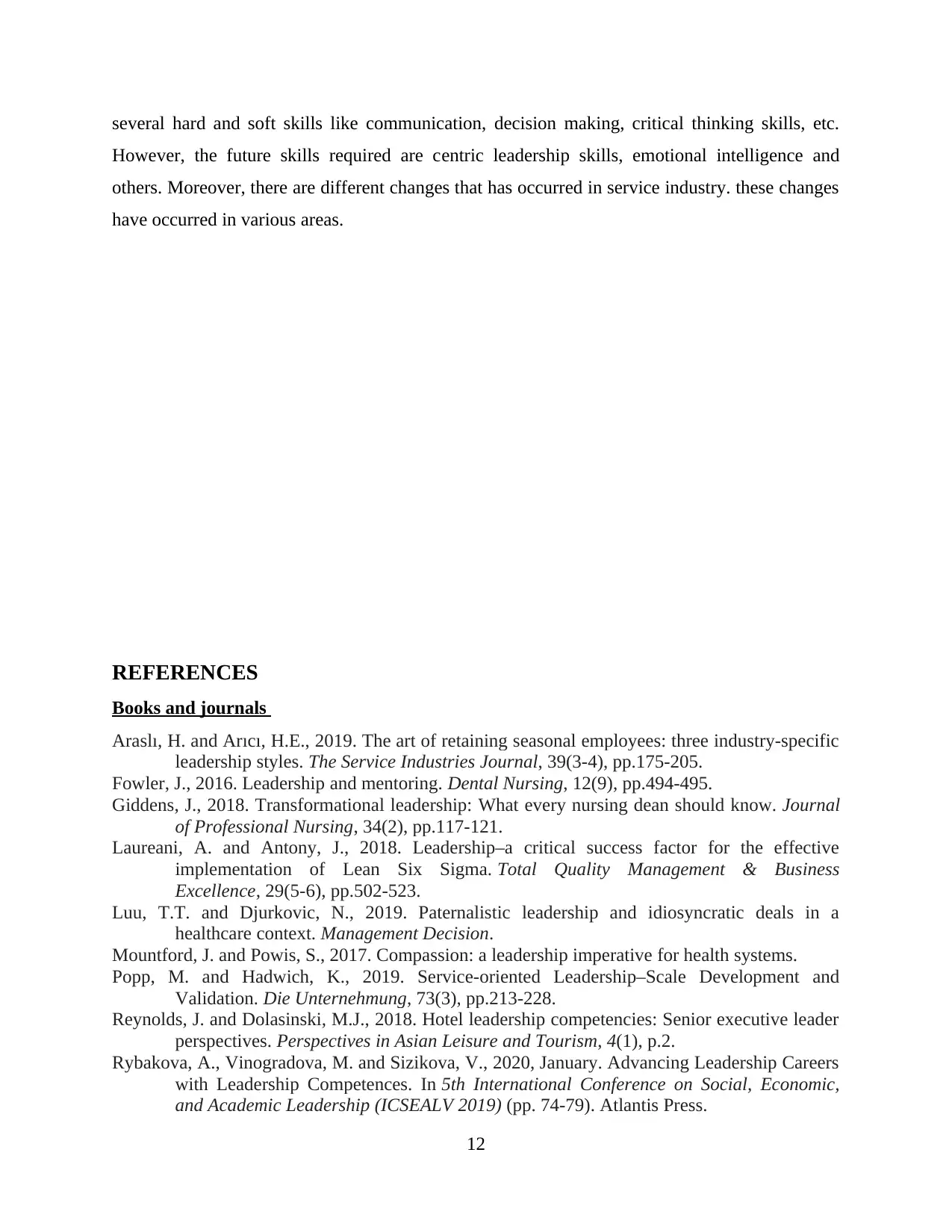
several hard and soft skills like communication, decision making, critical thinking skills, etc.
However, the future skills required are centric leadership skills, emotional intelligence and
others. Moreover, there are different changes that has occurred in service industry. these changes
have occurred in various areas.
REFERENCES
Books and journals
Araslı, H. and Arıcı, H.E., 2019. The art of retaining seasonal employees: three industry-specific
leadership styles. The Service Industries Journal, 39(3-4), pp.175-205.
Fowler, J., 2016. Leadership and mentoring. Dental Nursing, 12(9), pp.494-495.
Giddens, J., 2018. Transformational leadership: What every nursing dean should know. Journal
of Professional Nursing, 34(2), pp.117-121.
Laureani, A. and Antony, J., 2018. Leadership–a critical success factor for the effective
implementation of Lean Six Sigma. Total Quality Management & Business
Excellence, 29(5-6), pp.502-523.
Luu, T.T. and Djurkovic, N., 2019. Paternalistic leadership and idiosyncratic deals in a
healthcare context. Management Decision.
Mountford, J. and Powis, S., 2017. Compassion: a leadership imperative for health systems.
Popp, M. and Hadwich, K., 2019. Service-oriented Leadership–Scale Development and
Validation. Die Unternehmung, 73(3), pp.213-228.
Reynolds, J. and Dolasinski, M.J., 2018. Hotel leadership competencies: Senior executive leader
perspectives. Perspectives in Asian Leisure and Tourism, 4(1), p.2.
Rybakova, A., Vinogradova, M. and Sizikova, V., 2020, January. Advancing Leadership Careers
with Leadership Competences. In 5th International Conference on Social, Economic,
and Academic Leadership (ICSEALV 2019) (pp. 74-79). Atlantis Press.
12
However, the future skills required are centric leadership skills, emotional intelligence and
others. Moreover, there are different changes that has occurred in service industry. these changes
have occurred in various areas.
REFERENCES
Books and journals
Araslı, H. and Arıcı, H.E., 2019. The art of retaining seasonal employees: three industry-specific
leadership styles. The Service Industries Journal, 39(3-4), pp.175-205.
Fowler, J., 2016. Leadership and mentoring. Dental Nursing, 12(9), pp.494-495.
Giddens, J., 2018. Transformational leadership: What every nursing dean should know. Journal
of Professional Nursing, 34(2), pp.117-121.
Laureani, A. and Antony, J., 2018. Leadership–a critical success factor for the effective
implementation of Lean Six Sigma. Total Quality Management & Business
Excellence, 29(5-6), pp.502-523.
Luu, T.T. and Djurkovic, N., 2019. Paternalistic leadership and idiosyncratic deals in a
healthcare context. Management Decision.
Mountford, J. and Powis, S., 2017. Compassion: a leadership imperative for health systems.
Popp, M. and Hadwich, K., 2019. Service-oriented Leadership–Scale Development and
Validation. Die Unternehmung, 73(3), pp.213-228.
Reynolds, J. and Dolasinski, M.J., 2018. Hotel leadership competencies: Senior executive leader
perspectives. Perspectives in Asian Leisure and Tourism, 4(1), p.2.
Rybakova, A., Vinogradova, M. and Sizikova, V., 2020, January. Advancing Leadership Careers
with Leadership Competences. In 5th International Conference on Social, Economic,
and Academic Leadership (ICSEALV 2019) (pp. 74-79). Atlantis Press.
12
⊘ This is a preview!⊘
Do you want full access?
Subscribe today to unlock all pages.

Trusted by 1+ million students worldwide
1 out of 13
Related Documents
Your All-in-One AI-Powered Toolkit for Academic Success.
+13062052269
info@desklib.com
Available 24*7 on WhatsApp / Email
![[object Object]](/_next/static/media/star-bottom.7253800d.svg)
Unlock your academic potential
Copyright © 2020–2026 A2Z Services. All Rights Reserved. Developed and managed by ZUCOL.



